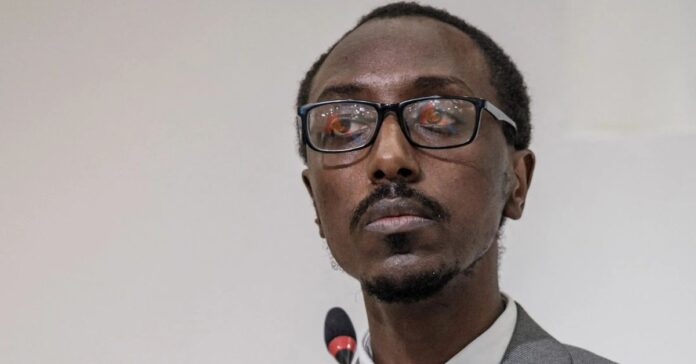Ethiopia’s Convenient Proxy Story Says More About Addis Ababa Than Eritrea. Every so often a political speech lands with the kind of confidence that makes you pause. Not because it reveals something new, but because it works so hard to make the familiar look like a revelation. That is what Ethiopia’s Foreign Minister Gedion Timothewos delivered at Addis Ababa University, a long, polished talk wrapped in history, diplomacy and careful language.
But beneath the formalities, he pushed several ideas, one of them was: Eritrea, he claimed, is acting as a proxy for foreign powers. It is a serious accusation and a strangely hollow one.
Anyone who has watched the Horn of Africa for the past few decades knows this storyline far from truth. In fact, it flips reality upside down. And it arrives at a moment when Ethiopia is struggling with its own internal crises and eyeing the Red Sea with a renewed hunger it can barely conceal.
When governments begin to reshape the past to soften the ground for their future ambitions, we should pay attention.
Eritrea as a proxy: the accusation that is ridiculous as it sounds, Gedion portrayed Eritrea as a country controlled by outsiders, manipulated by unseen hands, weaponized against Ethiopia’s interests. It is the oldest accusation in politics: if you cannot control your neighbor’s decisions, call those decisions foreign directed. The problem is simple.
It is not true and it ignores the region’s actual history.
Eritrea’s story, its struggles, its choices, its stubborn independence, has never fit neatly inside anyone’s geopolitical plans. No superpower liberated Eritrea. No patron shaped its national identity. Eritrea has made hard decisions, sometimes costly ones, but always on its own terms, for better or worse.
If we are talking proxies, Ethiopia’s own record is impossible to ignore. Here is the part of the conversation Gedion’s speech never touches. For decades, Ethiopia has been the region’s most reliable anchor state for outside forces. The 2006 invasion of Somalia was not an Ethiopian idea, it was behest of foreign power. The 1998 war with Eritrea unfolded with Western indulgence and encouragement. The sanctions regime that squeezed Eritrea for years had Addis Ababa’s fingerprints all over it, along with its external partners.
And now Ethiopia’s sudden obsession with what it calls existential access to the Red Sea aligns almost perfectly with the ambitions of the UAE, especially Abu Dhabi’s growing appetite for influence across the Red Sea corridor. This is not conspiracy. It is regional politics that everyone sees it.
So when Ethiopia accuses Eritrea of being someone else’s tool, it sounds less like a warning and more like projection. Why do this now? Because narratives shape maps. Ethiopia’s leadership understands something deeply: Before borders shift, stories shift.
If Eritrea can be portrayed internationally as a country acting on behalf of others, then its positions, especially on ports and sovereignty, can be dismissed as foreign influenced rather than legitimate. Once that seed is planted, Ethiopia’s maritime ambitions begin to look not aggressive, but defensive, not expansionist, but necessary, not opportunistic, but a correction of some historic wrong.
This is how governments prepare the ground before making bigger moves. First comes the narrative. Then comes the pressure. And then, if the world is inattentive, comes the irreversible.
Eritrean independence was earned the hard way, nobody gets to narrate it away. Eritrea’s foreign policy is not everyone’s cup of tea, but it has one undeniable trait: it is independent. Painfully independent. Sometimes stubbornly so. But always free from the dependency networks that have shaped so many other African states.
A country that refused foreign military bases, foreign aid strings, foreign political sponsorship, and foreign ideological umbrellas cannot be credibly described as a proxy.
Whether one approves of Eritrea’s choices or disagrees with them, they are Eritrea’s choices. And that matters. Because history has taught the Horn of Africa one harsh lesson: When a nation’s agency is dismissed, its sovereignty is not far behind. What Gedion’s speech really reveals is Ethiopia’s uncertainty. Behind the layers of scholarship and diplomacy, Gedion sounded like a government wrestling with internal fractures it does not know how to contain.
- A country facing rebellions in multiple regions.
- A leadership struggling to hold legitimacy.
- An economy leaning on foreign lenders and foreign investors.
- A government increasingly tied to UAE influence across the Red Sea corridor.
And now a state suddenly insisting its coastal ambitions are existential.
In such a moment, blaming Eritrea is a political convenience. Painting Eritrea as a proxy is a distraction. Invoking Eritrea is a way to shift the public gaze outward. This is what collapsing internal confidence looks like when dressed in diplomatic language. The Horn of Africa deserves better than recycled narratives.
This region has bled enough for ambition, suspicion and revisionist history. Eritrea and Ethiopia deserve a future not built on rhetorical shadowboxing or subtle threats disguised as regional integration. If Ethiopia wants peace, it should stop accusing its neighbor of being someone else’s puppet. If it wants access to the Red Sea, it should negotiate openly and respectfully, not build narratives that weaken Eritrea’s sovereignty by implication.
Because once powerful states or rising middle powers sense that a small coastal nation’s legitimacy is up for debate, the consequences are rarely reversible. In the end, the truth is simple: Eritrea acts for itself. Ethiopia often does not. And the sooner the region acknowledges that inversion, the sooner it can begin to have the honest conversations the Horn has avoided for far too long.
Eritrea is not a proxy. Eritrea is not a pawn. And no speech, however eloquent, can turn Ethiopia’s anxieties into Eritrea’s identity.
That is the story that needs to be told clearly and calmly.

